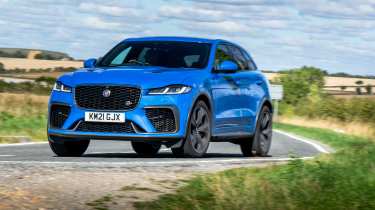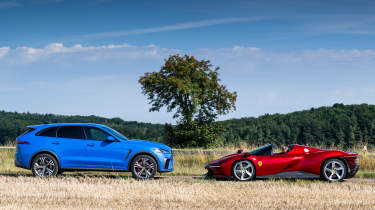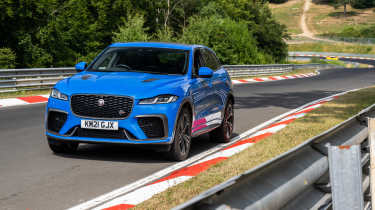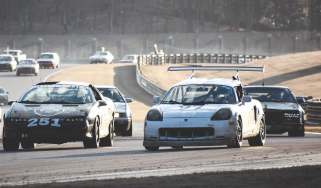Jaguar F-Pace SVR – living with it
Our ‘used’ F-Pace departs, having demonstrated a skill set that even the SUV haters had to admire
If you need confirmation of how impressive Jaguar’s F‑Pace SVR is, you only need to speak to its original keeper, evo’s former deputy editor Adam Towler. ‘I really like this car,’ he said. ‘I shouldn’t. I should hate it because it’s everything I don’t like in a performance car – any car – but it’s so good at doing exactly what it’s designed to do it’s near impossible to fault.’ High praise indeed, because Adam really does despise anything and everything to do with SUVs. So what does the F‑Pace have that others don’t?
It starts, as all good cars do, with a chassis crafted at the hands of experts, in this case the recently retired Mike Cross, the man responsible for the way Jaguars and Land Rovers have driven since the Discovery 3. From the moment we first drove the F‑Pace in 2016 we found it shone with a brightness lacking in so many rivals. Yes, you were conscious of its elevated driving position, the additional mass and an increase in body roll compared with an estate car, but even in its lowest trim level with the smallest four-cylinder engine the F‑Pace’s dynamic qualities were evident.
> Toyota GR Supra 2.0 Fast Fleet test – six months in the four-cylinder Porsche Cayman rival
More reviews
In-depth reviews
Reviews
Add a 542bhp 5-litre supercharged V8 into the mix and any notion that Jaguar’s first SUV would be pushed out of its comfort zone was debunked within the first few miles. And those thoughts were no different when our 2021 ‘used’ example of the F‑Pace SVR arrived during the late-summer heatwave of 2022.
Having already covered 20,000 miles on Jaguar’s fleet, we added close to 10,000 miles to this, and when it returned to Jaguar it not only looked as fresh as a new equivalent but drove like one, too. A faulty oxygen sensor on one bank of the V8 just before Christmas was the only blot on its copybook, although depending on your generation of smartphone and the software it was running there was also the occasional connection issue. But this was no more inconvenient than any other HMI system we’ve experienced.
There was a supersaloon vibe to the SVR that other performance SUVs at its price point struggle to match. On those long, monotonous journeys it felt assured and rock solid, never flinching, always on your side. On more interesting drives it carved a course that reminded you of an XFR saloon, with a precision to its controls and a flow to its gait that kept the cabin a calm oasis regardless of what was going on beneath it.
When a big journey was on the cards the F‑Pace’s key was often earmarked. On jaunts across Germany it delivered on its performance credentials with a willingness to sit at high speeds on the autobahn with utter confidence for hours on end, making it the perfect alternative to tiresome short-haul air travel.
On poor surfaces its Pirelli P Zeros were a little chatty and on a road an XFR-S Sportbrake would devour without flinching, the F‑Pace SVR would need to call on its underpinnings to put in some overtime, but it rarely, if ever, felt out of its depth when all its performance potential was called upon. When pushed, GJX’s steering remained crystal clear and its willingness to change direction at pace was at the opposite end of the spectrum to others in its segment that have a habit of falling over at the end of every straight.
As it enters its seventh year of production, the F‑Pace still feels ahead of the field in terms of how it drives. Just as Porsche’s Macan and Aston Martin’s DBX feel engineered to the very best of their capability rather than to a cost, so does the F‑Pace. Our long-termer also showed just how useful it was when the driving experience was secondary to performing a utility role. Staff photographer Aston Parrott was reluctant to hand it back once he discovered just how good it was at chasing – and staying ahead of – a bunch of current supercars on a group test, while also being able to swallow his latest Nikon delivery. Those of us with families and furry friends marked it out as the getaway wagon of choice. Refreshingly gimmick-free, it just did stuff remarkably well and beyond all expectations.
With a rather old-school supercharged V8 as a power source, it meant every driver was a frequent visitor to a petrol forecourt thanks to its 23.2mpg average (ouch indeed). In today’s world of high used car prices, GJX would command a sticker price of £63,000 with an approved Jaguar dealer, down from its original price of £81,565 with options (£77,595 basic) when it was new 18 months ago. A new SVR today starts at £87,230 on the road, including the £2365 of first-year VED.
As with Jaguar’s F‑type, there’s a charm about the F‑Pace that draws you in and makes you think that perhaps these two are more Aston Martin than today’s batch of Aston Martins. There’s more grace about how they go about their tasks and they have far stronger GT credentials, which makes it even more perplexing that Jaguar finds itself in the frail position it currently does. The products certainly aren’t what’s letting it down.
| Date acquired | July 2022 |
| Duration of test | 7 months |
| Total test mileage | 9194 |
| Overall mpg | 23.2 |
| Costs | £0 |
| Purchase price | £81,565 |
| Value today | c£49,000 |
This story was first featured in evo issue 308.






